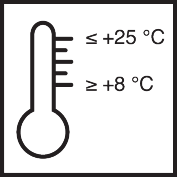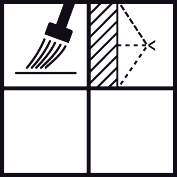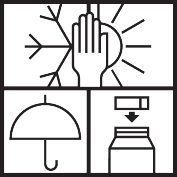Article No. 061605
Swelling inhibitor for natural stone with a clay/mineral structure
Product specifications
On delivery
The stated values represent typical product characteristics and are not to be construed as binding product specifications.
Field of application
- Natural stone with a clayey, mineral structure
- Reduction in weathering processes induced by clay mineral
Properties
- Reduction in amount of hygroscopic swelling
- Reduction in swelling speed
- Non-hydrophobising
- No increase in strength
-
Preparation
-
Substrate requirements
The substrate must be absorbent, clean, free of dust and dry.
-
Preparations
Any necessary cleaning measures should be performed as gently as possible, e.g. by spraying with cold or hot water or steam cleaning; stubborn dirt should preferably be cleaned using the rotec soft blasting method or Remmers cleaning products (e.g. Clean FP, Clean AC basic, Clean WR).
-
-
Application
-
Apply the primer abundantly by flow coating without pressure (avoid misting), so that a 30 - 50 cm long liquid film flows down the surface.
Apply horizontally on one section at a time, moving from top to bottom, and immediately go over with a wide brush.
Repeat the application several (at least two) times (wet on damp) until no further material is absorbed by the substrate.On surfaces where spray application is not possible, apply using a well-saturated brush.
-
Application instructions
-
Protect freshly treated surfaces from driving rain, wind, sunlight and condensation.
-
-
Working tools / cleaning
-
Non-corroding low-pressure, conveying and spraying equipment, liquid pumps, paintbrush and flat brush
-
Tools must be clean and dry.
Clean tools with water after use and before any lengthy interruptions to work.
Ensure that any residue from cleaning is disposed of correctly.
-
Storage / shelf life
-
If stored unopened in its original container in a cool, dry place and protected against frost, the product will keep for at least 12 months.
Use the contents of open containers as quickly as possible.
-
Usage
-
Shilf sandstone: 1.0 – 4.5 l/m²
Red sandstone: 0.3 – 2.5 l/m²
Tuff: 1.0 – 6.0 l/m²
Brick: 0.2 – 3.0 l/m² -
Apply to a large enough trial area to determine the precise amount required.
-
General information
-
Current regulations and legal requirements must be taken into account and deviations from these must be agreed separately.
The relevant test certificates must be observed when planning and carrying out work.
The level of absorption is crucial for the impregnation agent to work at its best. This depends on the respective pore volume and moisture content of the building material.
Residue (e.g. surfactants, wax) from previous cleaning measures can have adverse effects on the treatment and must therefore be completely removed.
High alkalinity may reduce the effectiveness.
-
-
Disposal instructions
-
Larger quantities of leftover product should be disposed of in the original containers in accordance with the applicable regulations. Completely empty, clean containers should be recycled. Do not dispose of together with household waste. Do not allow to enter the sewage system. Do not empty into drains.
-
-
Safety / regulations
-
For further information on the safety aspects of transporting, storing and handling the product and on disposal and environmental matters, please see the current Safety Data Sheet.
-










